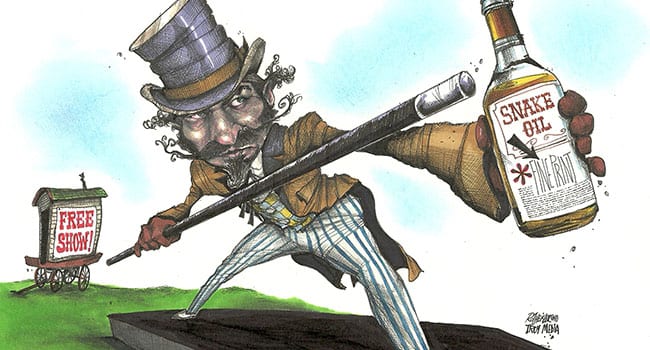By Milagros Palacios
and Bacchus Barua
The Fraser Institute
The fall federal election showed that politicians across the spectrum are happy to promise to spend more on our government-run health-care system. Whether the spending is for long-term care or pharmacare, the political solution to any health-care problem seems to be to pump more money into it.

Palacios
Of course, the Canadian taxpayer is stuck with the bill.
So just how large of a tab did we run up last year?
While it’s fairly easy to obtain a receipt for our health-care bill ($163 billion in 2018), most Canadians remain unaware of their individual contributions. This is through no fault of their own. It’s primarily because general government revenues – not a dedicated tax – finance health care in Canada. That means we pay for health care through a variety of taxes, including income, sales and so-called sin taxes on alcohol and tobacco.
Even per-person estimates ($4,389) are misleading because Canadians don’t pay equal amounts of tax each year. For example, children and dependents are not taxpayers.

Meanwhile, health insurance premiums in provinces that impose them only cover a fraction of the true cost of health care, which further exacerbates the confusion.
In reality, the amount we pay for health care through the tax system depends on family income and size. And while difficult, it’s possible to estimate these relative contributions using data from Statistics Canada and the Canadian Institute for Health Information. A recent study by the Fraser Institute does just that.
Calculating estimates across six common family types, the study finds that a typical Canadian family (two parents, two children) with an average household income of $140,049 will pay $13,311 for public health care this year. A single-parent family with two children (earning $65,858) will pay $3,833.
The amount individual Canadian families pay for health care varies widely across the income spectrum. For example, the 10 per cent of families with the lowest incomes (earning $15,070 per household, on average) will pay $464 for health care in 2019 while families in the top 10 per cent of income earners (with a household income of $298,872, on average) will pay $39,486.
Why should we care how much Canadian families pay for health care?
Because knowing how much we pay enables us to better judge whether we receive good value for our health-care dollars. For example, while some Canadians may consider these amounts reasonable for a system that provides life-saving treatment in the emergency room, others may rue the fact that despite spending thousands of dollars, they had to wait more than 26 weeks for neurosurgery last year.
By comparing how much families annually contribute towards the public system, we can better understand the impact of the growing burden of public health care.
For example, between 1997 and 2019, the cost of public health care for the average Canadian family grew 1.7 times faster than the average income. However – again due to the complex nature of how we pay for health care – many Canadians are unaware of this unsustainable growth in the cost of health care relative to their incomes.
These numbers should help disabuse Canadians of any notion that we have a ‘free’ health-care system. Families across Canada pay a lot for health care through our tax system, and it’s important they know just how much of the $163-billion bill is on their tab.
Milagros Palacios and Bacchus Barua are analysts at the Fraser Institute.
Milagros and Bacchus are Troy Media Thought Leaders. Why aren’t you?
The views, opinions and positions expressed by columnists and contributors are the author’s alone. They do not inherently or expressly reflect the views, opinions and/or positions of our publication.
